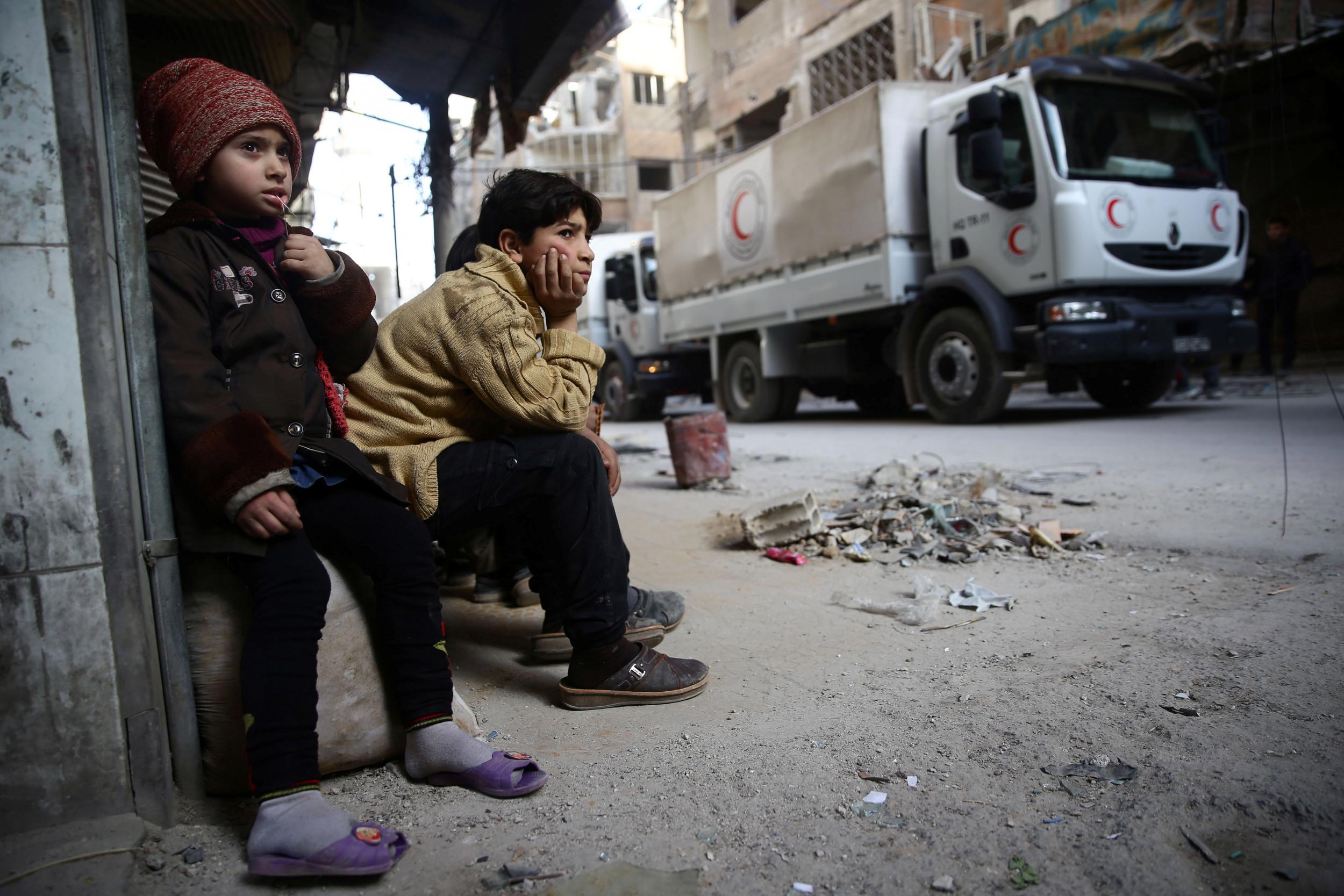Eastern Ghouta crisis: Aid shipment reaches civilians amid reports of chlorine attack and fresh air strikes
Humanitarian corridors opened by Russia to allow civilians to flee the area remain empty amid shelling fears

Your support helps us to tell the story
From reproductive rights to climate change to Big Tech, The Independent is on the ground when the story is developing. Whether it's investigating the financials of Elon Musk's pro-Trump PAC or producing our latest documentary, 'The A Word', which shines a light on the American women fighting for reproductive rights, we know how important it is to parse out the facts from the messaging.
At such a critical moment in US history, we need reporters on the ground. Your donation allows us to keep sending journalists to speak to both sides of the story.
The Independent is trusted by Americans across the entire political spectrum. And unlike many other quality news outlets, we choose not to lock Americans out of our reporting and analysis with paywalls. We believe quality journalism should be available to everyone, paid for by those who can afford it.
Your support makes all the difference.The first aid delivery to reach a besieged rebel area of Damascus in weeks had to be cut short because of government-led shelling while aid workers were still in the vicinity, the International Red Cross Committee (ICRC) has said.
A convoy of 46 trucks entered eastern Ghouta on Monday for the first time since an intense government assault on the area began two weeks ago. It carried enough food for approximately 27,500 of the area’s estimated 400,000 population, but the World Health Organisation (WHO) said that up to 70 per cent of the medical supplies on board had been offloaded – a common practice in Syria’s war.
While aid workers were still distributing the cargo in the town of Douma shelling from government-held neighbourhoods resumed, the IRCR confirmed on Tuesday, leading nine of the trucks to evacuate with supplies still on board.
The fresh strikes combined with the discovery of bodies in rubble from previous days upped Monday’s death toll to around 90 people, by local counts – the highest since a supposed UN ceasefire was brokered on 24 February.
The humanitarian situation appears to be worsening due to the lack of food and adequate medical help and significant internal displacement is starting to occur, local activists said.
Families who have spent the last two weeks hiding in basements near the front lines are starting to flee further inside the besieged zone to escape shelling and air strikes, sources on the ground and monitors confirmed.
Humanitarian corridors opened by Russia to allow civilians to flee the area remain empty, however, as residents fear shelling of the routes by both government and rebel forces.
On Tuesday the Russian defence ministry offered rebels safe passage out of eastern Ghouta with their families – but unlike in other sieges, such as east Aleppo, there is no nearby rebel stronghold to evacuate to.The Russian proposal did not specify where the rebels would go but in previous deals insurgents have been given safe passage to Idlib province in northwest Syria.
More than 700 people have been killed in the two-week-old assault, monitors say, despite pleas from the UN and humanitarian organisations for both sides to uphold the supposed 30-day-ceasefire.
Damascus and its allies in Moscow argue that the rebel fighters they are targeting are members of banned terrorist groups who are not protected by the truce.
The Syrian army has captured more than a third of the enclave over the last three days in an attempt to split it in two.
The UN hopes to be able to send another convoy on Thursday, Jens Laerke of the body’s Coordination of Humanitarian Affairs (Ocha) office told reporters.
Meanwhile, medical staff in Hammouriya in eastern Ghouta reported 12 people from two families were admitted to hospital with chlorine gas inhalation symptoms after a strike late on Monday night. There were no fatalities.
US President Donald Trump and French President Emmanuel Macron repeated their opposition to chemical weapons usage as a “red line” in Syria’s seven-year-old war last week.
Rescue workers say President Bashar al-Assad’s forces has repeatedly used chlorine gas as a weapon in eastern Ghouta in recent weeks, claims which the government has strongly denied.
Join our commenting forum
Join thought-provoking conversations, follow other Independent readers and see their replies
Comments